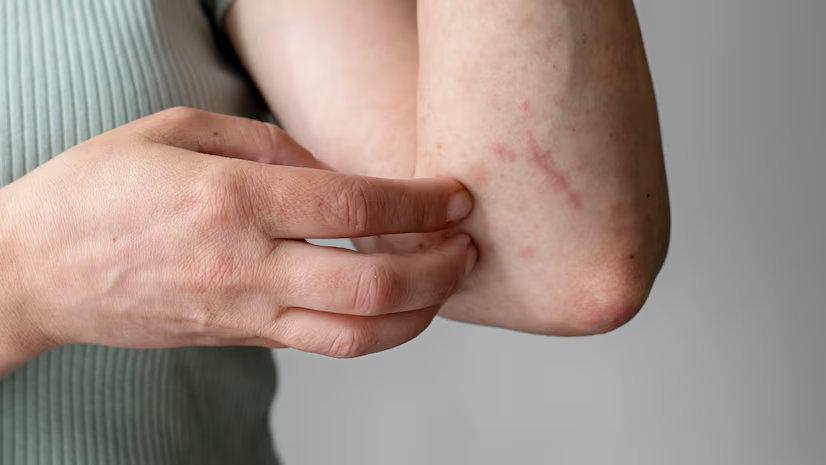
Have you ever experienced the perplexing sensation of having skin that is unusually sensitive to touch, yet despite careful inspection, you find no visible cause for your discomfort? If you have, you are not alone. This peculiar condition, often described as having "skin sensitive to touch but nothing's there," can be a source of frustration and confusion for many individuals.
This blog post will delve into the intricacies of skin sensitivity without a visible cause, exploring its possible origins, coping strategies, and available resources. So, whether you are personally dealing with this enigmatic condition or seeking to understand it better, read on to unravel the mysteries behind having skin sensitive to touch when nothing seems to be there.
What is Skin Sensitivity and its Types

Skin sensitivity refers to an increased reactivity or heightened response of the skin to various stimuli, such as touch, pressure, temperature, or certain substances. It is characterized by a heightened awareness or discomfort when these stimuli come into contact with the skin.
When it comes to skin sensitivity, specifically to touch, it refers to a condition where the skin becomes excessively responsive or reactive to even the slightest touch, leading to discomfort or pain. This sensitivity can occur in localized areas or affect the entire body.
Skin sensitivity refers to an increased reactivity or heightened response of the skin to various stimuli, such as touch, pressure, temperature, or certain substances. It is characterized by a heightened awareness or discomfort when these stimuli come into contact with the skin.
There are different types of skin sensitivity, including:
Naturally Sensitive Skin
: This type of sensitivity is genetic and can be linked to inflammatory skin conditions such as [eczema](https://www.mayoclinic.org/diseases-conditions/atopic-dermatitis-eczema/symptoms-causes/syc-20353273#:~:text=Atopic%20dermatitis%20(eczema), rosacea, and psoriasis. Individuals with naturally sensitive skin may experience heightened sensitivity to touch and other triggers specific to their condition.Environmentally Sensitive Skin
: As the name suggests, this type of sensitivity is triggered by environmental factors. Sun exposure, cigarette smoke, air pollution, and other elements the skin encounters can cause stinging, irritation, or an exacerbated response to touch.Reactive Skin
: Reactive skin refers to skin that becomes red and inflamed in response to certain skincare products. It can result in very red, warm, and irritated skin, often accompanied by the formation of papules or pustules in the areas where the irritant was applied.Thin Skin
: As we age, our skin naturally becomes thinner. Thinner skin is more susceptible to irritation and can be more sensitive to touch. The thinning of the skin can also make it more prone to damage from external factors.Skin sensitivity to touch can be attributed to various factors. According to Amy B. Lewis, M.D., a board-certified dermatologist in New York City, sensitive skin can be caused by the irritation of nerve endings in the top layer of the skin. This irritation can lead to heightened sensitivity and response to touch stimuli.
Common Causes of Skin Sensitivity To Touch

Eczema
Eczema is a chronic inflammatory skin condition that can cause dryness, redness, itching, and sensitivity. People with eczema often experience increased sensitivity to touch, and their skin may become easily irritated.
How to Manage
Use a fragrance-free, hypoallergenic moisturizer and apply it multiple times daily, especially after bathing or washing your hands. Use gentle, fragrance-free, and hypoallergenic skincare products specifically formulated for sensitive skin. A dermatologist may prescribe topical corticosteroid creams or ointments to reduce inflammation and relieve itching in moderate to severe cases.Dry Skin
When the skin lacks moisture and becomes dry, it can become more sensitive and prone to irritation. Environmental factors like low humidity or excessive bathing can aggravate dry skin.
How to Manage
Choose a rich, emollient moisturizer that is fragrance-free and specifically formulated for dry or sensitive skin. Use a humidifier in your home, particularly during winter or dry climates. Opt for gentle laundry detergents and avoid fabric softeners or dryer sheets that can irritate sensitive skin.Rosacea
Rosacea is a chronic skin condition characterized by facial redness, flushing, visible blood vessels, and sometimes small, red bumps. People with rosacea may have heightened sensitivity to touch on their faces, and certain triggers like spicy foods, alcohol, or temperature changes can worsen their symptoms.
How to Manage
Use mild, non-abrasive cleansers and avoid harsh scrubs or exfoliants that can aggravate the skin. Wear a broad-spectrum sunscreen with a high SPF, seek shade, and wear protective clothing. Avoid skincare products with potential irritants such as alcohol, fragrance, or harsh chemicals.Irritant Contact Dermatitis
Irritant contact dermatitis occurs when the skin directly interacts with irritating substances, such as harsh chemicals, detergents, or certain skincare products. It can lead to skin sensitivity to touch, redness, itching, and a burning sensation.
How to Manage
A dermatologist may prescribe topical corticosteroid creams or ointments to help reduce inflammation and relieve symptoms such as redness and itching. Numbing creams containing topical anesthetics can also provide temporary relief. Taking a cool oatmeal bath can help soothe irritated skin and reduce itching.Allergic Contact Dermatitis
Allergic contact dermatitis is an allergic reaction when the skin comes into contact with an allergen, such as certain metals (e.g., nickel), latex, or specific ingredients in cosmetics or personal care products. It can cause skin sensitivity, redness, swelling, itching, and a rash.
How to Manage
Over-the-counter topical creams or oral antihistamines can help reduce itching, redness, and inflammation. Choose gentle dish soaps, detergents, and laundry products free from fragrances and harsh chemicals.If you have a known allergy to certain metals, such as nickel, applying a layer of clear nail polish to metal objects that come into contact with your skin (e.g., jewelry, buttons) can create a barrier and help prevent direct contact, reducing the risk of an allergic reaction.
Contact Urticaria (Hives)
Contact urticaria is a localized allergic reaction that occurs when the skin comes into contact with an allergen, resulting in hives. It can make your skin sensitive to touch, inflamed, and itchy.
How to Manage
Over-the-counter oral antihistamines and topical corticosteroid creams or ointments can help reduce inflammation and itching. NSAIDs, such as ibuprofen and naproxen, effectively reduce pain and swelling.Physical Urticaria
Physical urticaria refers to hives or skin rash triggered by physical stimuli, such as pressure, friction, heat, cold, or vibration. These stimuli make your skin sensitive to touch and the formation of welts or raised bumps.
How to Manage
Over-the-counter or prescription oral antihistamines can help reduce the release of histamine and alleviate symptoms of physical urticaria. If pressure or friction triggers your symptoms, consider wearing loose-fitting clothing and avoiding tight accessories. Wearing gloves when engaging in activities that involve prolonged contact or pressure on the hands can also help protect your skin.Photodermatoses
Photodermatoses are skin disorders that result in abnormal reactions to sunlight or artificial light sources. Exposure to light can trigger skin sensitivity to touch, leading to redness, itching, and rash-like symptoms.
How to Manage
Apply a broad-spectrum sunscreen with a high sun protection factor (SPF) to all exposed areas of the skin. Wear clothing with a high ultraviolet protection factor (UPF) that can block harmful UV rays, such as garments labeled with a UPF rating. If you experience sunburn or skin irritation from sun exposure, applying aloe vera gel can help soothe the skin and provide relief.These are just a few common causes of skin sensitivity to touch. If you experience persistent or severe symptoms, it is advisable to consult with a dermatologist for an accurate diagnosis and appropriate treatment options.
Coping Strategies and Management for Skin Sensitivity

If you have skin sensitive to touch but nothing's there, it becomes crucial to establish practical coping strategies and management techniques. Consider the following approaches that can assist:
Here are some approaches that can help:
Gentle Skincare Routine
Opt for gentle, fragrance-free, and hypoallergenic skincare products specifically formulated for sensitive skin. Avoid harsh ingredients, excessive scrubbing, or abrasive exfoliation, as they irritate the skin further. Moisturize regularly to maintain skin hydration.
Patch Testing
Before using new skincare products or cosmetics, perform a patch test on a small area of your skin to check for any adverse reactions. This can help identify potential irritants or allergens and prevent further skin sensitivity to touch.
Sun Protection
Protect your skin from the sun's harmful UV rays by wearing a broad-spectrum sunscreen with a high SPF, seeking shade, and wearing protective clothing. Sunburn and UV exposure can exacerbate skin sensitivity.
Avoid Triggers
Identify and avoid triggers that worsen your skin sensitivity. This may include certain fabrics, environmental factors like extreme temperatures or pollution, specific foods or beverages, or known irritants.
Moisturize Regularly
Dry skin can contribute to skin sensitivity. Keep your skin well-hydrated by applying moisturizer regularly, especially after bathing or washing your hands.
Cool Compresses
If your skin is sensitive to touch, apply cool compresses to the affected areas. The cool temperature can help soothe the skin and provide temporary relief.
Stress Management
Stress can exacerbate skin sensitivity. Practice stress management techniques such as deep breathing, meditation, or yoga to promote overall relaxation and well-being.
Protective Clothing
When possible, wear soft and breathable fabrics to minimize friction and irritation on the skin. Consider wearing protective gloves or clothing when exposed to potential irritants or during activities that may aggravate your skin.
Seek Professional Advice
Consult a dermatologist or healthcare professional specializing in skin conditions to receive a comprehensive evaluation and personalized recommendations for managing your skin sensitivity.
Conclusion
By understanding the causes of skin sensitivity to touch and implementing appropriate management techniques, individuals can find relief, improve their skin health, and enhance their overall well-being. While it may take some trial and error to find the most effective management strategies, individuals with skin sensitivity can lead fulfilling lives by taking proactive measures to minimize discomfort and maintain healthy skin.






